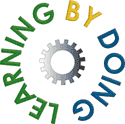What do candidates on the AC Inverter DRIVES training course actually do?
The ac inverter drives course provides an extensive understanding of the relationships between speed and torque and voltage and frequency of industrial motors.
The course notes are quite extensive and explain how ac drives create the PWM output signal as a method of simulating a variable-voltage variable-frequency sinewave, without getting involved in the underlying theory. For example, we would look in detail at what signals are produced at the output of a drive, but only very briefly at how the remainder of the electronics work. Some sample pages from the course notes give an indication of this approach:
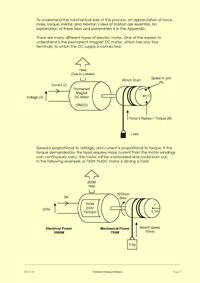 |
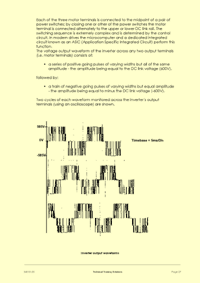 |
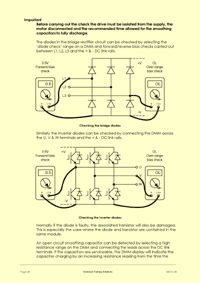 |
Page 7 of the inverter training course notes, describing how torque and speed are related |
Page 27 of the inverter training course notes, showing what the PWM waveform generated by electronic motor drive units looks like |
Page 48 of the inverter training course notes, describing the typical faults developed in the drive output stages and how to find them |
Candidates on the ac drives inverter training course then have the opportunity to configure an industrial drive unit connected to a real three-phase motor on one of our specially-designed training rigs. Each of the major manufacturers of drive units are represented. Candidates can explore how changing the parameters of the drives alters their behaviour at start-up, while running at various speeds, and at switch-off. All of this can be done in perfect safety - an opportunity they are unlikely to have with the drives they have in their workplaces.
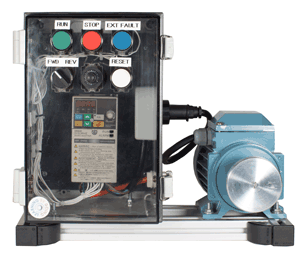 |
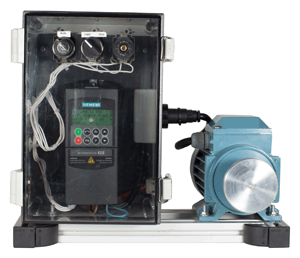 |
The Omron training rig used on the inverter training course: a real industrial drive connected to a real 3-phase motor so that candidates can explore the effects of changing parameters on the Omron drive |
The Siemens training rig used on the inverter training course: a real industrial drive connected to a real 3-phase motor so that candidates can explore the effects of changing parameters on the Siemens drive |
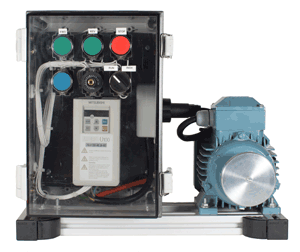 |
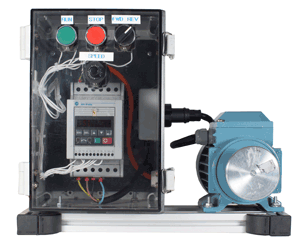 |
The Mitsubishi training rig used on the inverter training course: a real industrial drive connected to a real 3-phase motor so that candidates can explore the effects of changing parameters on the Mitsubishi drive |
The Allen Bradley training rig used on the inverter training course: a real industrial drive connected to a real 3-phase motor so that candidates can explore the effects of changing parameters on the Allen Bradley drive |
Candidates use various sorts of test equipment throughout the course. Standard digital multimeters are used to test the serviceability of a drive's power module (the most commonly failing part in any drive unit), tachos are used to measure the motor speed accurately, current clamp meters are used to monitor the current flow to the motor and a digital oscilloscope is used to analyse the drive's PWM output waveform.
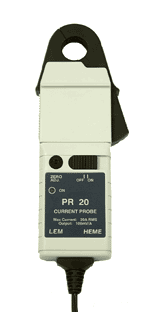 |
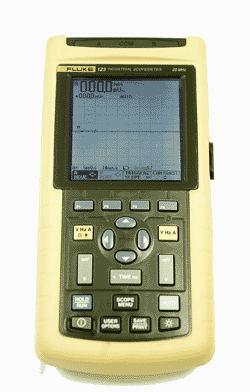 |
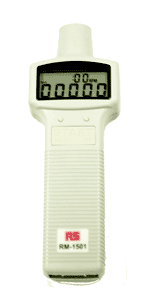 |
The current probe used on the inverter training course |
The digital storage oscilloscope used on the inverter training course |
The electronic tacho used on the inverter training course |
Safety issues are, of course, paramount considerations, and the dangers of incorrect parameter settings, the dangers of electric shock whilst working 'live' and making measurements (particularly with regard to the high energy capacitors found inside inverter drives), as well as the physical dangers associated with unexpected motor movement are all covered on the course, as are the important issues of emc and installation earthing and suppression components.
If you would like to see some of the equipment used on the ac inverter drives training course for yourself, then please call us to arrange a visit to our offices in Kent. Alternatively, we can visit you anywhere in the British Isles.
